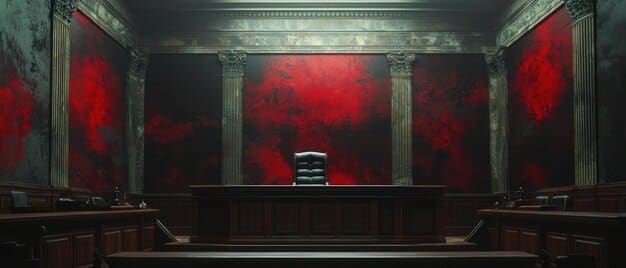Legal Drama Plot Holes: Spotting Fictional Inaccuracies

Legal drama plot holes often involve unrealistic courtroom procedures, inaccurate forensic science, and the exaggeration of attorneys’ roles and powers, undermining the credibility of the narrative.
Legal dramas captivate audiences with their high-stakes narratives and intricate courtroom battles. However, even the most compelling shows often fall prey to legal drama plot holes: unraveling the most common fictional inaccuracies. Let’s dive into the world of on-screen legal proceedings, examining the most egregious misrepresentations of the law.
Unrealistic Courtroom Procedures
One of the most glaring issues in legal dramas is their portrayal of courtroom procedures. Real-life trials are often slow and methodical, while television trials are fast-paced and filled with dramatic surprises. The sensationalism often overshadows accuracy.
Hearsay and Admissibility
Hearsay, an out-of-court statement offered in court to prove the truth of the matter asserted, is frequently misunderstood and misused in legal dramas. Attorneys are often portrayed as objecting to any statement they dislike.
In reality, hearsay rules are intricate, with numerous exceptions. Simply objecting to a statement as hearsay isn’t enough; the attorney must explain why the statement fits the definition and doesn’t fall under any exception.

The “Gotcha” Moment
Legal dramas love to showcase the “gotcha” moment, where an attorney pulls out a surprise witness or piece of evidence that changes the entire course of the trial. While these moments can be exciting, they are rarely realistic.
- Discovery Process: In reality, most evidence is disclosed during the discovery phase, preventing major surprises.
- Ethical Obligations: Attorneys have ethical obligations to share evidence with the opposing side.
- Judicial Oversight: Judges closely monitor the introduction of evidence to ensure fairness.
These procedures minimize the potential for dramatic, last-minute revelations that are common in fiction. The emphasis is on transparency and due process.
Courtroom procedures in legal dramas often prioritize entertainment over accuracy. These shows tend to condense timelines, amplify dramatic moments, and simplify complex legal rules. This may make for compelling viewing, but it does not reflect the reality of the legal system.
Inaccurate Forensic Science
Forensic science plays a crucial role in many legal dramas, but its portrayal often veers into the realm of fantasy. Shows frequently depict forensic techniques as infallible and providing definitive answers.
CSI Effect
The “CSI effect” refers to the phenomenon where jurors expect forensic evidence in every case and give it more weight than it deserves. This is largely due to the unrealistic portrayal of forensic science in television shows.
Real forensic science is often less conclusive. Techniques like DNA analysis, fingerprinting, and ballistics can provide valuable evidence, but they are not foolproof.
Exaggerated Accuracy
Many legal dramas depict forensic tests as providing instant and definitive results. In reality, forensic analysis can be time-consuming and subject to interpretation.
- Human Error: Forensic analysis is performed by humans, which means it is susceptible to errors.
- Contamination: Evidence can be contaminated, leading to inaccurate results.
- Subjectivity: Some forensic techniques rely on subjective interpretations, which can vary between analysts.
The infallible lab results showcased in legal dramas contrast with the constraints of real science, where uncertainty is part and parcel of the investigation.
By exaggerating the accuracy and reliability of forensic science, legal dramas create unrealistic expectations among viewers. This can have real-world consequences, as jurors may demand forensic evidence that isn’t available or give undue weight to flawed forensic analysis.
Misrepresentation of Attorneys’ Roles
The roles and powers of attorneys are often exaggerated and misrepresented in legal dramas. Attorneys are frequently depicted as having unchecked authority and engaging in unethical behavior without consequences.
Ethical Violations
Legal dramas often feature attorneys who engage in unethical behavior, such as withholding evidence, intimidating witnesses, or colluding with judges. While unethical conduct does occur in the real world, it is far less common than portrayed on television.
In reality, attorneys are bound by strict ethical rules and regulations. They can face severe consequences, including disbarment, for violating these rules.
Overstated Powers
Legal dramas frequently depict attorneys as having the power to single-handedly sway a case through dramatic speeches or clever cross-examination. While these skills are important, they are not the only factors that determine the outcome of a trial.

- Evidence: The strength of the evidence is often the most critical factor.
- Jury Composition: The composition of the jury can also play a significant role.
- Judicial Rulings: Judges make critical rulings that affect the direction of the trial.
Attorneys in legal dramas are portrayed performing duties that in reality are done by judges and paralegals, giving a false view of their actual role.
Legal dramas exaggerate the roles and powers of attorneys for dramatic effect. This can lead to a distorted view of the legal profession and undermine the public’s understanding of the legal system.
Unrealistic Trial Timelines
Legal dramas often compress trial timelines, presenting cases that would take weeks or months in real life as being resolved in a few episodes. This dramatic shortening leads to oversimplified narratives and improbable outcomes.
Skipping Pre-Trial Procedures
In real life, a significant amount of time is spent on pre-trial procedures such as discovery, motions, and plea negotiations. Legal dramas often gloss over these stages.
These procedures are essential for preparing a case and ensuring a fair trial. By omitting them, legal dramas create a false sense of immediacy and excitement.
Condensed Court Sessions
Legal dramas typically condense courtroom sessions, presenting only the most dramatic moments. In reality, trials involve long hours of tedious testimony and legal arguments.
By only showing the highlights, legal dramas create a distorted view of the trial process. This can lead viewers to believe that trials are always exciting and unpredictable.
The fast-paced timelines in legal dramas do not mirror the reality of court proceedings. This compression results in an oversimplified and often unrealistic portrayal of the legal process, which can be misleading for viewers.
Misunderstanding of Legal Jargon and Terminology
Legal dramas often misuse legal jargon and terminology, either to sound more authentic or to create dramatic tension. However, these misrepresentations can confuse viewers and undermine the credibility of the show.
Incorrect Usage
Shows will sometimes use legal terms incorrectly or out of context. This can be confusing for viewers who are not familiar with the legal system.
Correct use of legal terms is essential for clear communication. Misusing these terms can create confusion and undermine the viewer’s understanding of the case.
Oversimplified Explanations
Legal dramas sometimes provide oversimplified explanations of complex legal concepts. This can be misleading and create a false sense of understanding.
Legal concepts are often nuanced and require careful explanation. Oversimplifying these concepts can lead to misunderstandings and inaccurate conclusions.
Misunderstandings of legal jargon and terminology are common in legal dramas. These inaccuracies can confuse viewers and undermine the show’s credibility. Accurate use of legal terminology is crucial for properly understanding the legal process.
The “Perry Mason” Myth
The “Perry Mason” myth refers to the idea that a lawyer’s primary goal is to uncover the truth and exonerate their client, regardless of the evidence. This is a common trope in legal dramas, but it is not an accurate portrayal of the legal profession.
Duty to Advocate
In reality, a lawyer’s primary duty is to advocate for their client’s best interests within the bounds of the law. This does not necessarily mean uncovering the truth or exonerating their client.
A lawyer’s role is to provide the best possible defense for their client, even if they believe the client is guilty. Lawyers must follow ethical rules and legal precedents.
Confidentiality
Lawyers have a duty to maintain client confidentiality. This means they cannot disclose information about their client’s case without the client’s consent, even if they believe it would help uncover the truth.
While some lawyers do try to uncover the truth, their primary responsibility is to their client. The pursuit of justice is often seen as a secondary goal.
The “Perry Mason” myth distorts the public’s understanding of the legal profession. The myth can lead to unrealistic expectations for lawyers and undermine trust in the legal system.
| Key Element | Brief Description |
|---|---|
| 🎬 Dramatic Courtroom Antics | Trials are compressed and filled with sensational surprises, unlike real-life methodical procedures. |
| 🔬 Forensic Fantasy | Forensic science is portrayed as infallible, offering instant and definitive results, which deviates from the accurate science. |
| ⚖ Attorney Overreach | Attorneys wield unchecked power, engaging in unethical behavior, a gross exaggeration of their real-world constraints. |
| 📜 Confusing Jargon | Legal jargon is misused or oversimplified, causing audience misunderstandings and erosion of credibility. |
Frequently Asked Questions
▼
Courtroom procedures are altered for dramatic effect, prioritizing entertainment over accuracy. Real trials are slow, methodical, and often lack the sensational surprises seen on television.
▼
The “CSI effect” leads jurors to expect forensic evidence in every case and to give forensic findings more weight than deserved. This stems from the exaggerated portrayal of forensic science.
▼
No, ethical violations by attorneys are far less common in the real world. Legal dramas frequently depict attorneys behaving unethically for dramatic effect, while actual attorneys are bound by strict ethical rules.
▼
Trial timelines are compressed to fit the narrative into episode lengths, which results in oversimplified, unrealistic portrayals of the legal process. Real trials take weeks or months.
▼
The “Perry Mason” myth is the idea that a lawyer’s main goal is to uncover the truth, regardless of evidence. This is inaccurate, as lawyers are obligated to advocate for their client’s best interests within legal bounds.
Conclusion
While legal dramas provide engaging entertainment, it’s essential to recognize their frequent deviations from reality. From unrealistic courtroom procedures to exaggerated roles of attorneys, these inaccuracies often distort the public’s understanding of the legal system. Approaching these shows with a critical eye helps distinguish fiction from reality, allowing for a more informed perspective on judicial processes.





